- 1go 针对 time类型字段,前端查询,后端返回数据格式为UTC时间
- 2git clone没有权限的解决方法_git没有权限clone代码
- 3Kafka-消费者(订阅主题消费数据及常用调优参数解析)
- 4Raid介绍_服务器raid
- 5mysql 数据导入sqlserver_如何从mysql中将数据导入到sqlserver
- 6【Python数据挖掘课程】四.决策树DTC数据分析及鸢尾数据集分析_decision tree test data
- 7Mysql查看连接并批量kill线程_show processlist kill 批量
- 8vue3.0使用axios 解决跨域问题_vue3 axios跨域
- 9Python 数据挖掘 | 第3章 使用 Pandas 数据分析_pandas 并计算潜力低、中等、优秀三个等级的数量
- 10如何读源码-方法论总结_常用方法论总结
数学建模比赛中,chatgpt、文心一言如何提问更有效?_数学建模比赛用chatgpt
赞
踩
在数学建模的战场上,ChatGPT和文心一言可是我们的“神助攻”!但想让它们发挥出最大威力,提问可是个技术活。问题问得好,答案跑不了;问题问得妙,解决没烦恼!
下面我就一个实际的对话为例,带大家看看提问的技巧。
首先第一回合,先使用我教给大家的prompt(提示):
假设你是一名数学建模的专家,我是一名大学生,目前要参加一个数学建模比赛。我需要你的帮助来解决比赛中的问题。请根据以下指引思考并协助我: (1)问题背景理解: 阅读并重述题目的关键点。这个问题是如何产生的,与哪些领域相关? 是否有相似的案例或问题?它们是如何解决的?可以从相关论文中学到什么? (2)假设和变量提出: 基于实际情况,提出哪些假设来简化问题?这些假设可能对结果产生哪些影响? 识别问题中的关键变量及其相互关系。这些关系是线性、非线性还是其他? (3)问题归类: 该题目属于哪种类型的问题,如评价、预测、优化或图论?每个小问的类型是什么? (4)数学模型构建: 使用哪些数学方程或不等式来描述这些变量间的关系?是否需要引入辅助变量或参数? 考虑问题性质,选择哪种模型?对类似问题有哪些参考论文? (5)解决方案和优化: 根据建立的模型,初步的解决方案应该是什么?有哪些不同的方法? 使用哪些标准或指标来评估解决方案的有效性,如精度、效率、可靠性或实用性? 如果有不足,如何优化模型?是否可以通过调整参数、改进算法或引入新数据来提高性能? (6)实际应用和局限性: 在实际应用中,这个模型可能遇到哪些挑战?我们如何应对这些挑战? 识别并讨论模型的局限性。对这些局限性,我们可以采取哪些改进措施? 请在回答问题时,给出详细、可行的解题思路和步骤。另外,在分析过程中,同一个题目可以给多个解题的思路,并评估哪个解题的方案更容易实施。 如果需要数据,请指示数据的获取方式。 (后续所有的回答请使用中文) 下面是我的数学建模竞赛的问题: 2023 ICM Problem E: Light Pollution Background Light pollution is used to describe any excessive or poor use of artificial light. Some of the phenomena that we refer to as light pollution include light trespass, over-illumination, and light clutter. These phenomena are most easily observed as a glow in the sky after the sun has set in large cities; however, they may also occur in more remote regions. Light pollution alters our view of the night sky, has environmental impacts and affects our health and safety. For example, plant maturation may be delayed or accelerated, and migration patterns of wildlife affected. Excessive artificial light may confuse our circadian rhythms, leading to poor sleep quality and perhaps physical and mental health issues. Glare caused by artificial lights may contribute to some motor vehicle accidents. Community officials or local groups may implement intervention strategies to mitigate the negative effects of light pollution. Artificial light, however, has both positive and negative effects that impact different locations in different ways. For example, to avoid the negative impacts of light pollution listed above, some communities opt for low-light neighborhoods which in turn might lead to increased crime. The impacts of light pollution may depend on factors such as the location’s level of development, population, biodiversity, geography, and climate. Therefore, assessing the extent of the effects and the potential impacts of any intervention strategies must be tailored to a specific location. Requirement COMAP’s Illumination Control Mission (ICM) is working to promote awareness of the impacts of light pollution and develop intervention strategies to mitigate those impacts. In support of this ICM work, your task is to address measuring and mitigating the effects of light pollution in various locations, incorporating both human and non-human concerns. Specifically, you should: Develop a broadly applicable metric to identify the light pollution risk level of a location. Apply your metric and interpret its results on the following four diverse types of locations: a protected land location, a rural community, a suburban community, and an urban community. Describe three possible intervention strategies to address light pollution. Discuss specific actions to implement each strategy and the potential impacts of these actions on the effects of light pollution in general. Choose two of your locations and use your metric to determine which of your intervention strategies is most effective for each of them. Discuss how the chosen intervention strategy impacts the risk level for the location. Finally, for one of your identified locations and its most-effective intervention strategy, produce a 1-page flyer to promote the strategy for that location. Glossary Artificial Light: Any non-naturally occurring source of light. Circadian Rhythms: The natural 24-hour sleep-wake cycle on which humans and other organisms operate. Glare: Excessive brightness that decreases one’s ability to see. Intervention Strategies: Policies and/or actions that could be taken to disrupt the negative impacts of light pollution. Light Clutter: Excessive grouping of lights. Light Trespass: When light enters unintended areas. Over-Illumination: Lighting at an intensity higher than what is needed for an activity or location. Protected Land: Areas that governments or private entities protect from development due to their ecological, cultural, and/or natural importance. Rural Community: A community located in one of the least densely populated parts of a country or region, and not easily accessible from an urban community. Suburban Community: A community located in a moderately densely populated part of a country or region, or easily accessible from an urban community. Urban Community: A community located in one of the most densely populated parts of a country or region.
我这里就是以去年的美赛E题为例,使用最开始的prompt后,直接把题目粘贴过去了。
我们来看看chatgpt4的回答:



![]()
接下来,你就可以根据回答的内容,进行进一步的询问!
例如我们举个例子:假设我对这个评估模型感兴趣,我可以这样问:

我们来看chatgpt的回答:
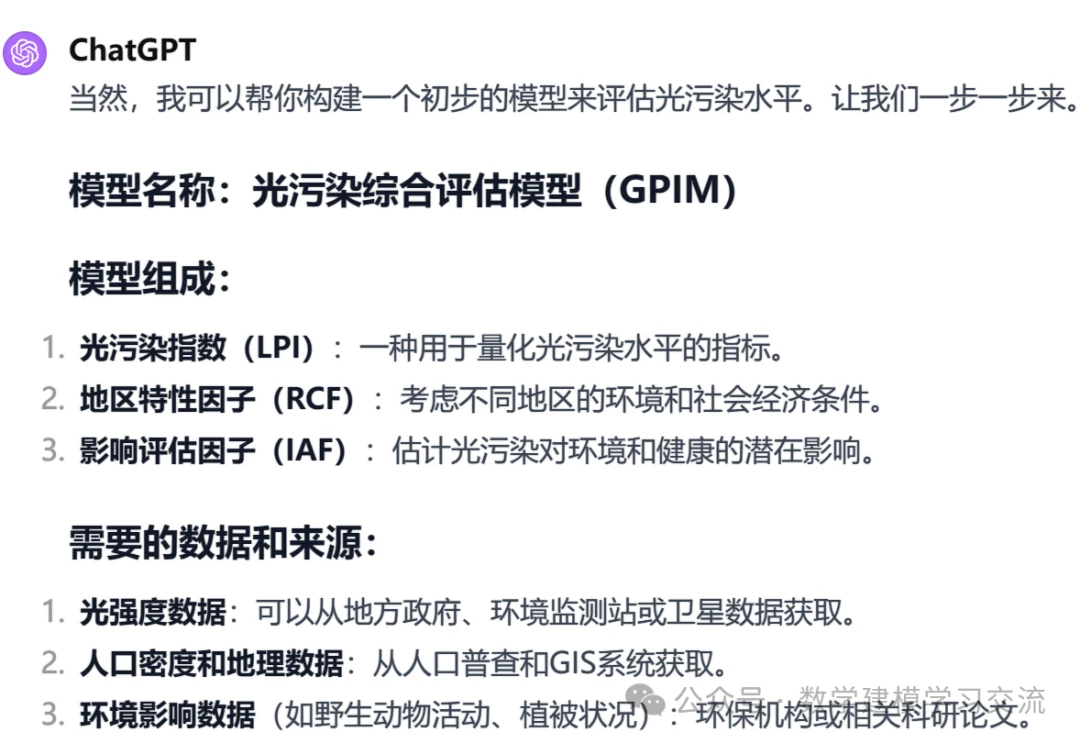
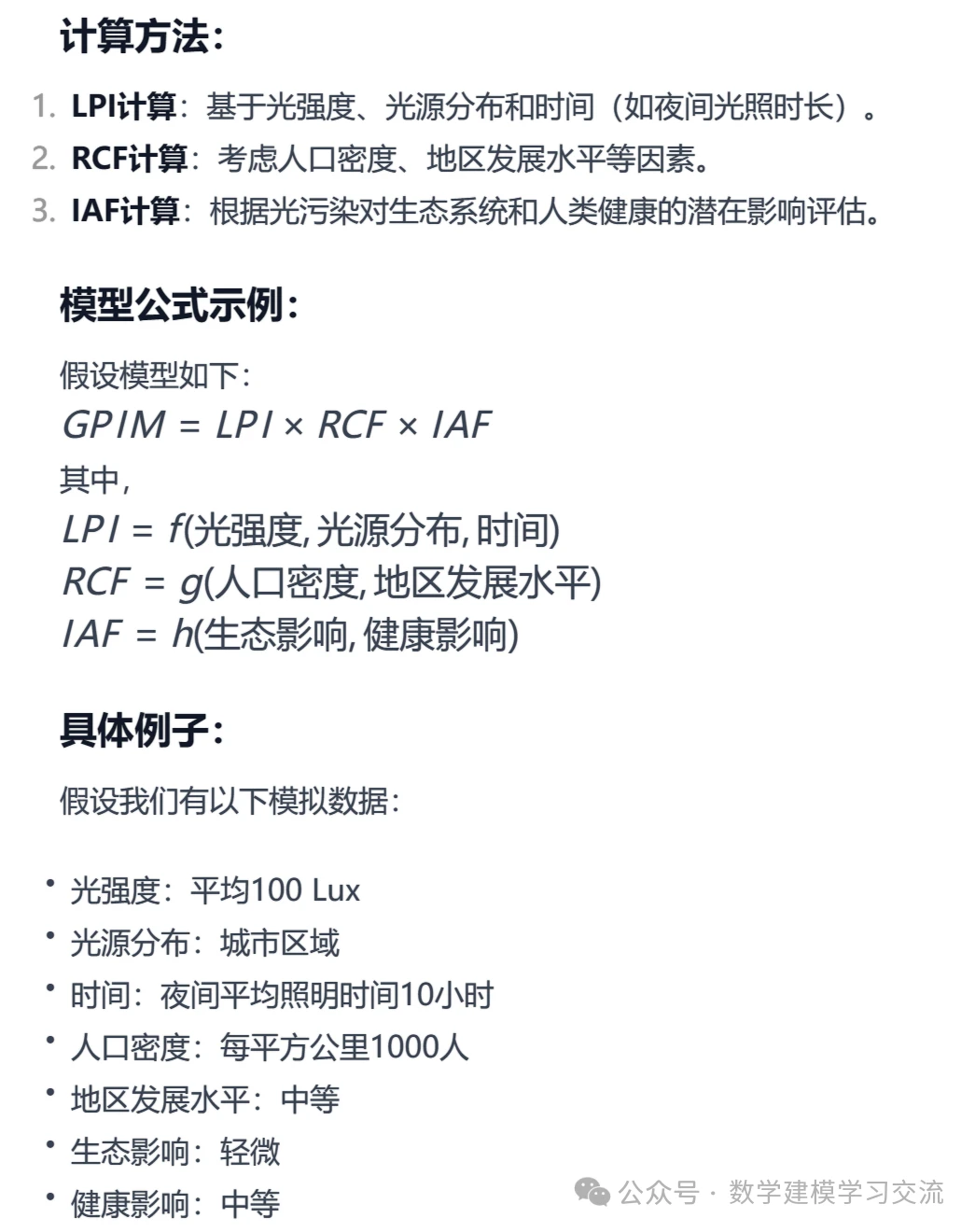

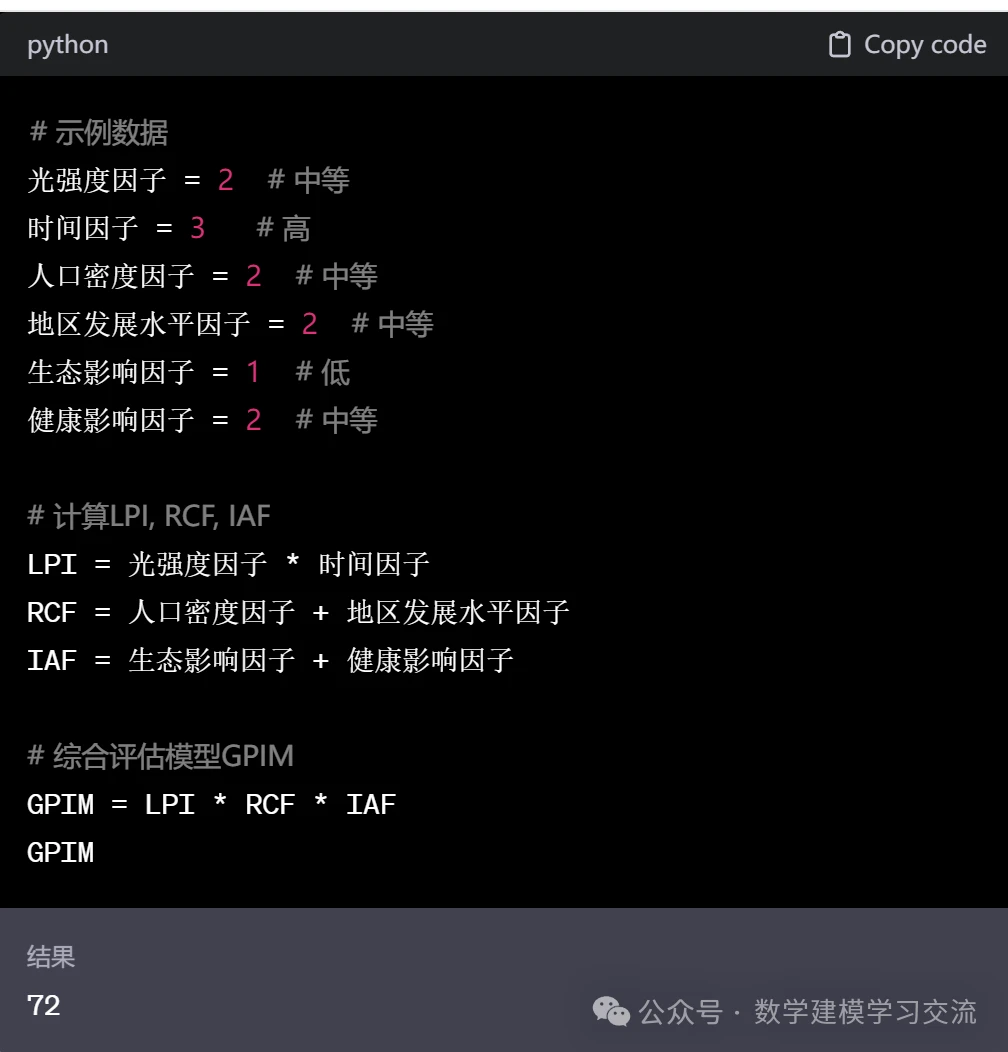
![]()
再比如,我对这个模型中的指标感兴趣,我们可以接着问:
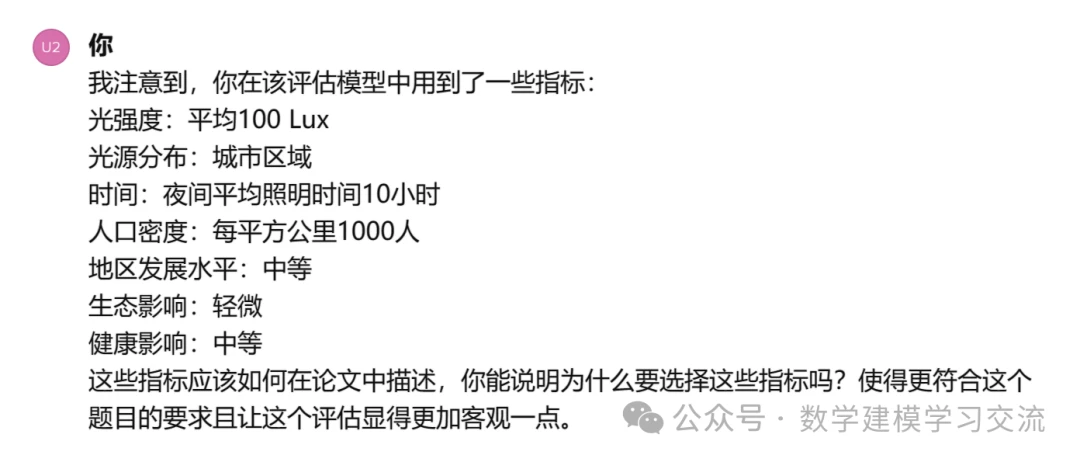
我们来看chatgpt的回答:
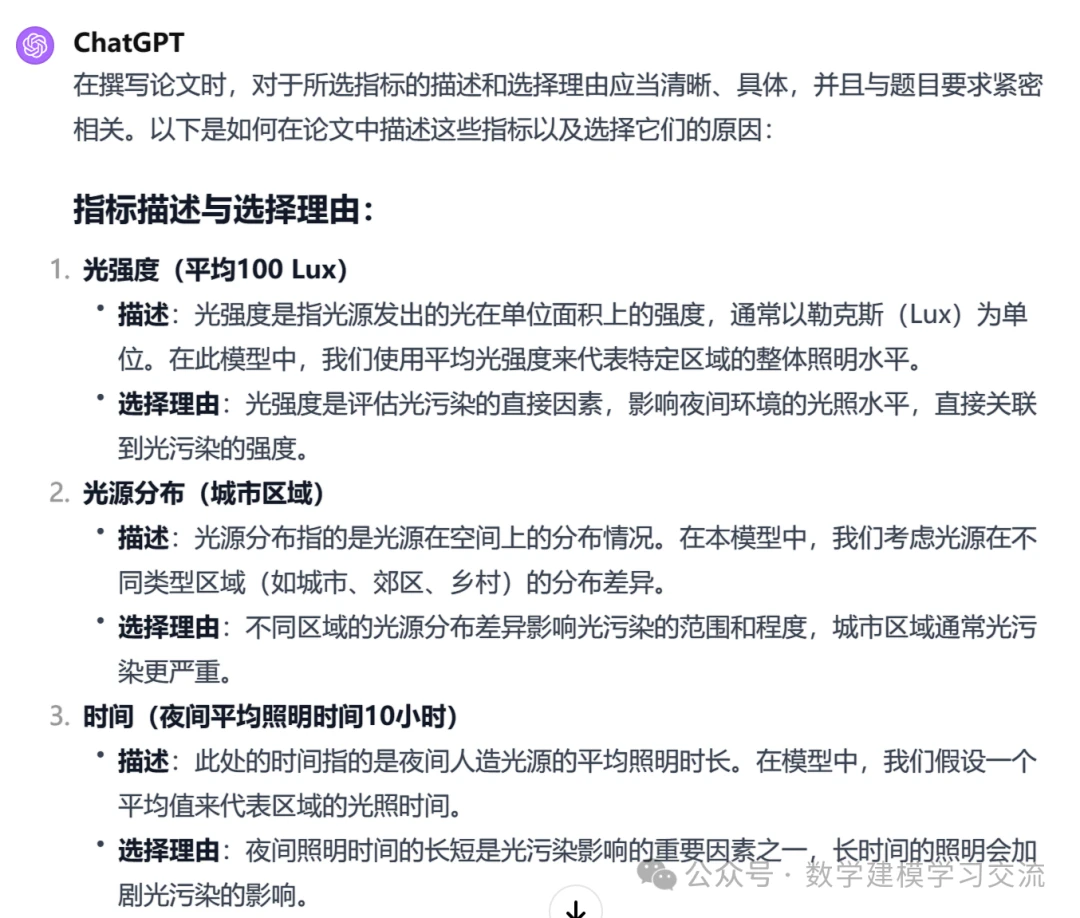
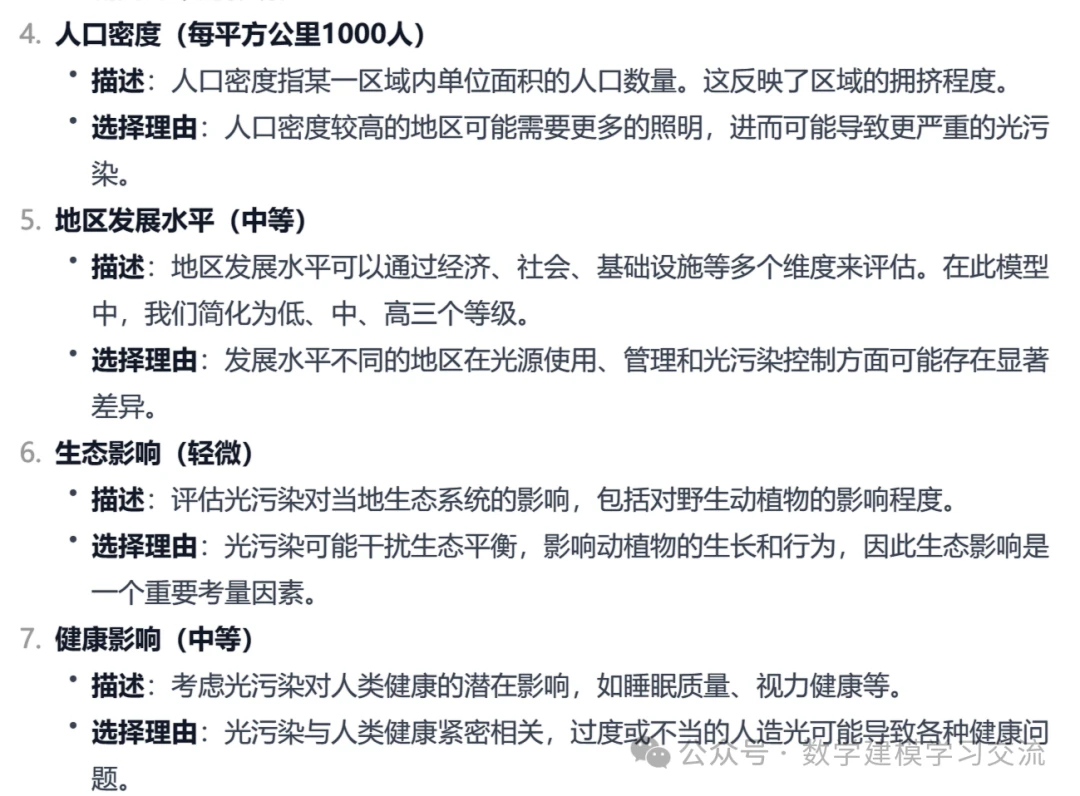

当然,你也可能觉得这个模型过于简单,我们可以让chatgpt修改模型:

我们来看修改后的模型:
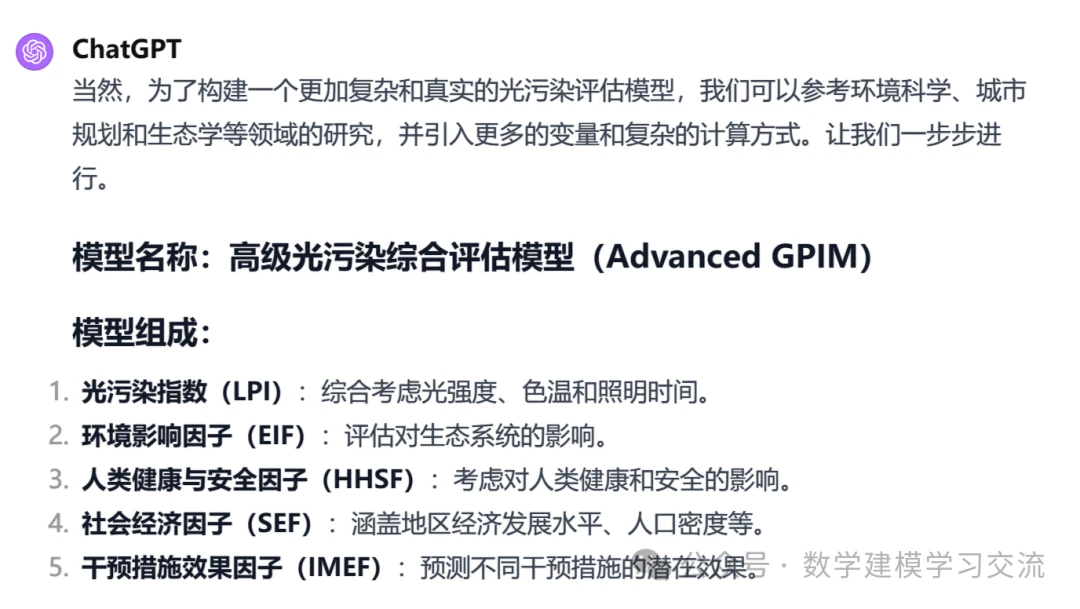
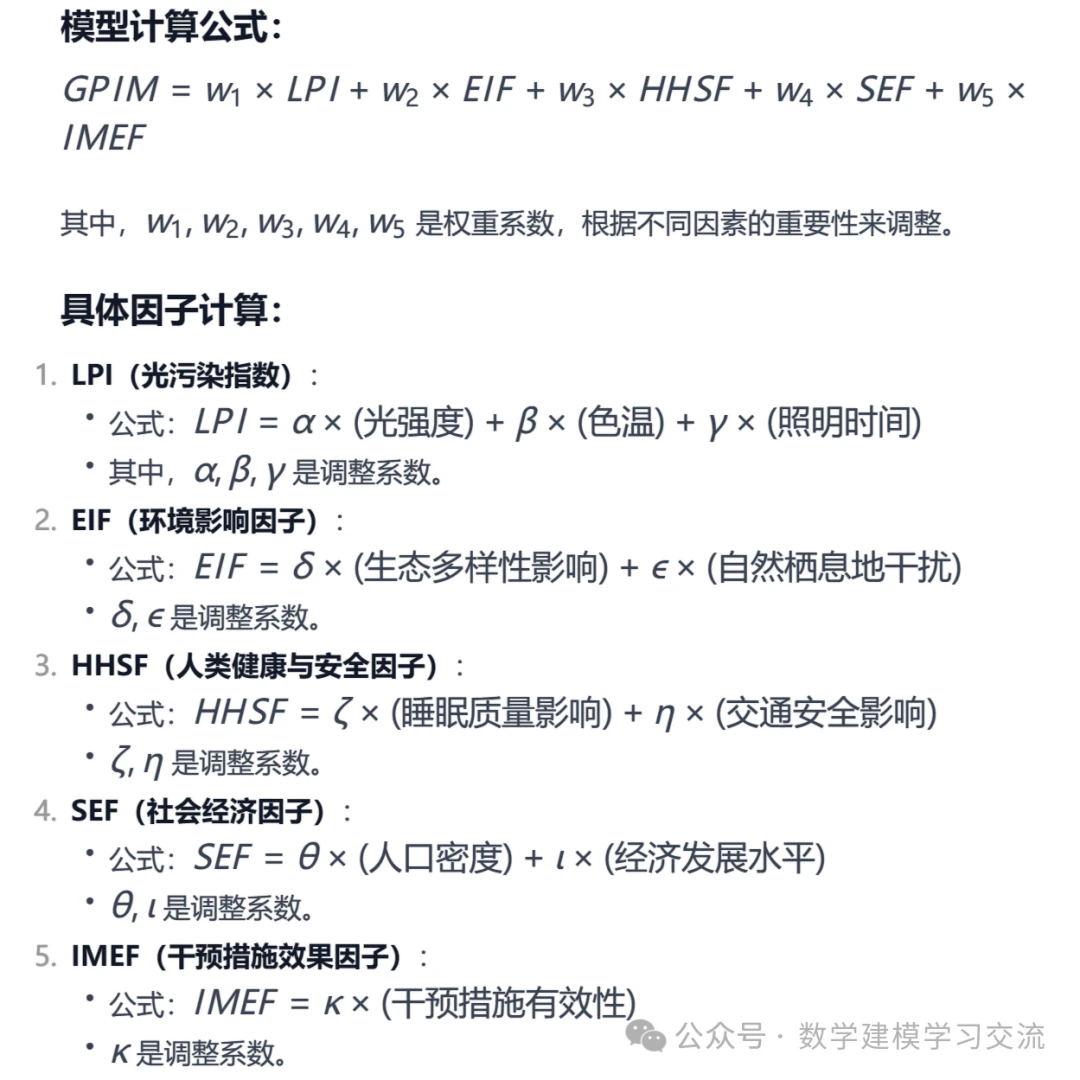

![]()
如果你不知道应该如何引出该模型,你可以这样问:
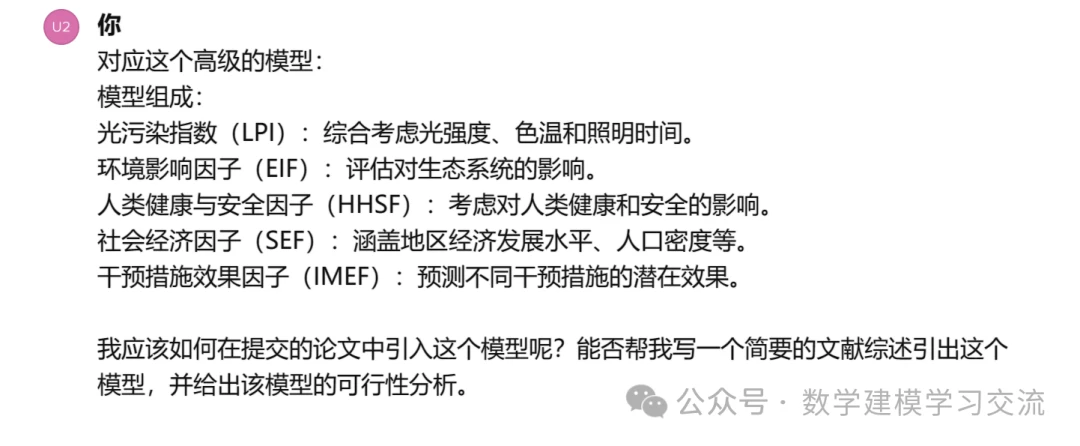
我们来看chatgpt的回答:
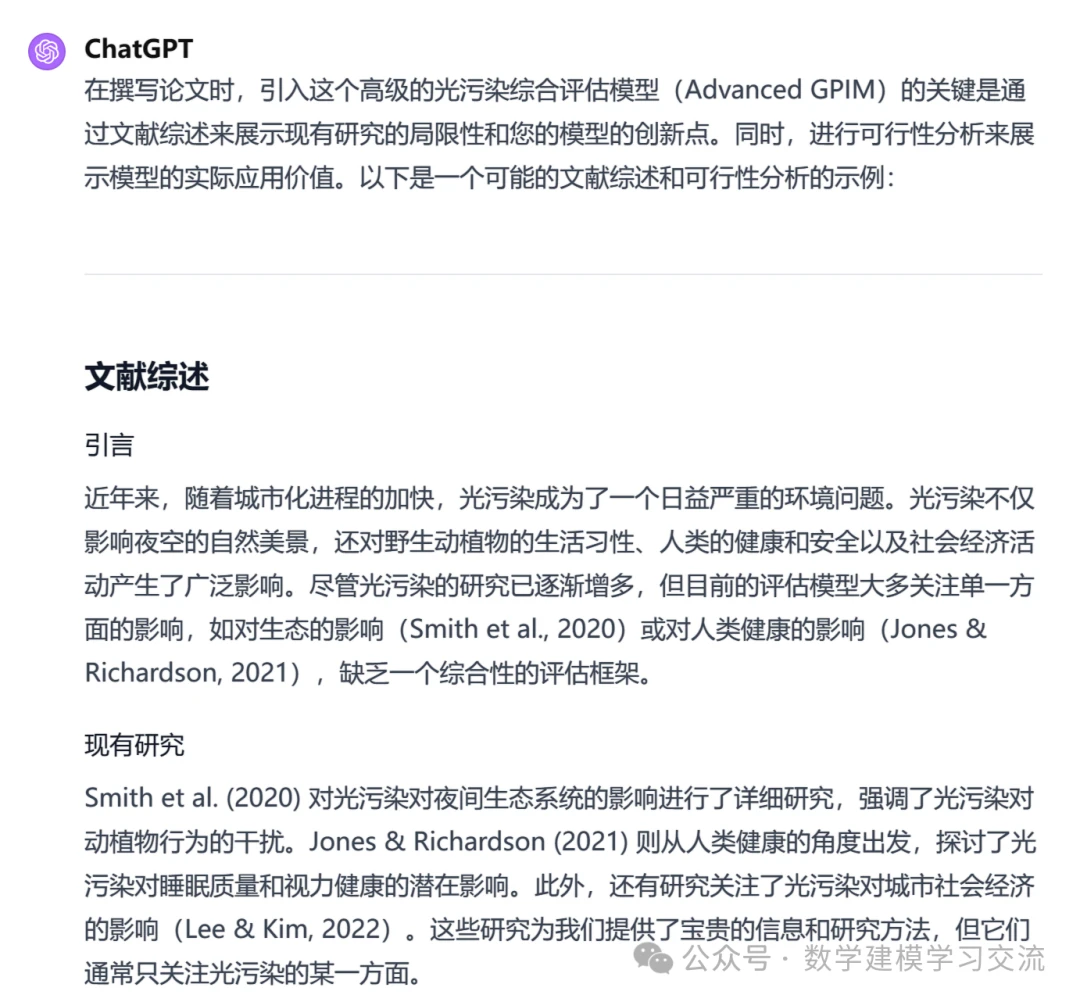

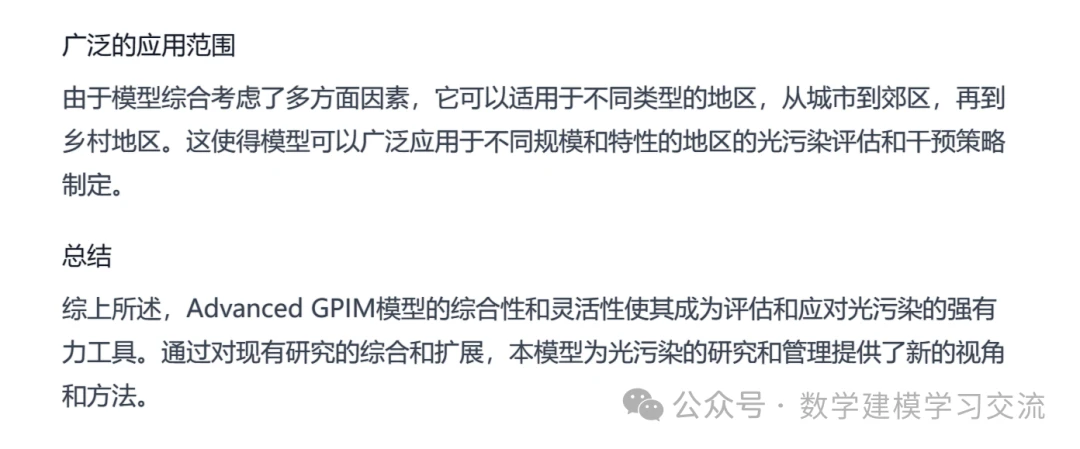
从上面的例子可以看出,使用大语言模型的确能对建模过程起到很大的帮助。有能力的同学推荐使用chatgpt4。
不喜欢折腾的同学也可以使用国内的文心一言,推荐大家使用文心一言的4.0版本,价格是chatgpt4的三分之一,能力介于chatgpt3.5和chatgpt4之间。


